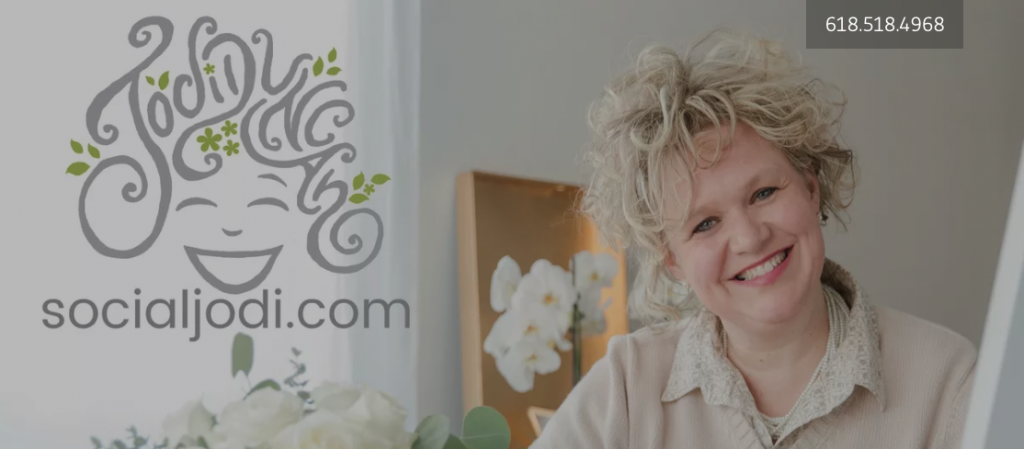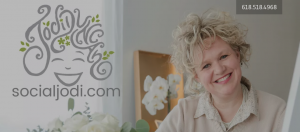Earlier this month, Jodi Duncan, AIFD, shared a short, conversational video about the difference between purchasing flowers artfully arranged by a professional florist and choosing a too-good-to-be-true Internet promotion (i.e. blooms in a box). To make her point, she held up a chocolate chip cookie and then a basket with said cookie’s ingredients. “Same thing, right?” she asked the audience. “No, it is not.”
Her PSA Valentine’s Day video, viewed approximately 80,000 times, coincided with the formal launch of the Illinois designer’s latest business venture: Social Jodi, a marketing consultation/coaching service. We caught up with her earlier this week to learn all about it.
F20: What was the impetus behind Social Jodi?
JD: In July, I took over the social media accounts for DesignMaster Color Tool, a company I’ve represented as a spokesperson for years and whose products I’ve used since I was about 15. I’ve been in retail for 30 years and have always had to market myself. To be able to do that for another company — anonymously — has been really fulfilling. As the months have gone on, I realized I really had a knack for it. DesignMaster has seen at least 5 percent growth on all their social platforms. I started thinking, I could duplicate this experience for other people. It’s a passion of mine to help people tell their stories.
F20: How important is social media for small business owners?
JD: Social media is huge for every business, big and small. I don’t think that’s a secret to anyone, but still, a lot of people aren’t putting out content like they should. Some people are simply too busy working in their business to work on it, while others are just intimidated. Sometimes we overthink things and then become paralyzed. But it’s like basketball — you don’t get better by thinking about the sport or by reading about it. You get better by playing. You just have to try. It takes practice to get it right.
F20: What are some social media best practices?
JD: There’s a lot of strategy that goes into it, which I discuss in detail with my clients. But some of the basics are intuitive. People don’t want to be sold to. If everything you post is a pitch, they’re going to tune out or unfollow you. You need to give them something provides value, whether that’s information — like care and handling tips or “>educating them about order gatherers, box shippers, and deceptive advertisers — or entertainment. Once you get their attention, you really don’t want to annoy them. Think about when you click on a post and see it’s a list spread out over 50 slides? You probably won’t interact with any content on that page ever again. Ultimately, you want to analyze your audience, identify what’s painful for them, solve their problems, and bring some value to their day.
F20: Is Social Jodi exclusively for florists?
JD: Floristry is obviously close to my heart and a field I know very well, but I’m open to working with anyone. I have a team of about six people and we started working with a few clients in October. Some of them include photographers, convenience stores, nonprofits and landscapers. They all do different things, but the approach is the same: to tell a personal story.
F20: How does Social Jodi work?
JD: We offer a couple different packages, ranging from six months to a year. You really can’t get much traction in any periods shorter than that. For some people, it’s mostly consultation or coaching, whereas others turn over their passwords and we do it all for them. If it’s out of my zone of genius, I outsource. I have a good team of freelancers who are experts on things like video and photography, Facebook and Instagram ads, and search engine optimization.
F20: Is this replacing your design work—or in addition to it?
JD: I still get to do floral design, weddings, give presentations at shows, etc.
F20: How do you juggle it all?
JD: Well, for starters, it’s invigorating to reinvent myself. Keeps things interesting! I also really believe in the power of routines. I try to have a formula for starting the day and not deviate from it. I feel like, if I do these things every morning, then I’m okay. For instance, I don’t take my phone off airplane mode until 9:30 and don’t check email until 10. This way, I set my day; the day doesn’t set me. It helps me start from a place of sanity. Everybody’s routine will look differently—maybe it involves exercise, meditation, prayer, or a home-cooked breakfast—but it’s important to have habits to stay grounded. I mean, if your relationships are falling apart, you’re eating garbage, or you haven’t seen your kids in five days—what’s the point? You have to be successful in your life before you can sustain success in your business. This is something else we trumpet at Social Jodi, so I guess you could say we do counseling too!
Additionally, I also rely heavily on Base Camp, which is a tremendous time management tool—pretty much the most awesome thing in the world. It keeps all my projects together and lets me know what I need to do. It’s collaborative, compiles messages from different platforms and keeps them linear, and links easily to Dropbox. It keeps my feet to the fire.
F20: Where do you find inspiration?
JD: You know, it’s hard to say. I’m just naturally curious. Inspiration’s everywhere; you just have to pay attention. That’s why it’s important to not be on your phone all the time. At 9 p.m., my husband, daughter and I turn in our devices for the day and just enjoy each other’s company. We also ban phones from the dinner table. It’s so important to be in the moment to catch things.
F20: Any final thoughts about social media?
JD: Social media really takes it on the chin. Everyone’s saying that it’s evil and destroying our society. It’s not! It just magnifies things. If you’re a lousy person in real life, it just shows up more on Facebook or Instagram. Are you sharing other people’s content or just posting selfies and other egocentric material? Are you facilitating dialogue or just writing snarky comments? Social media is not inherently bad or good. It’s a lot like fire. We can use it to cook or create warmth — or we can use it to burn down a village. It’s all about how we choose to use it.
For more information, visit socialjodi.com.


